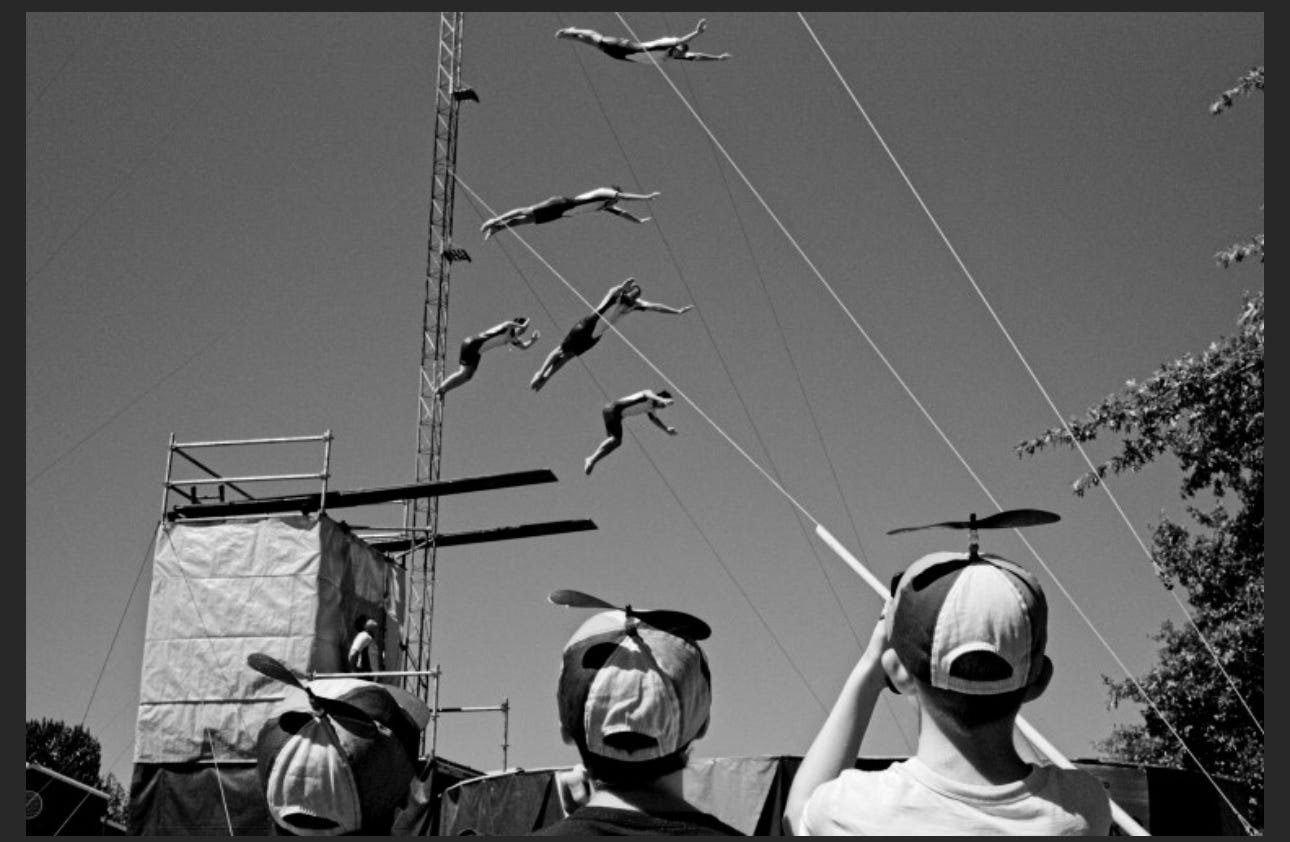Being Better
Peuple basque, Bilbao. Pierre de Vallombreuse,
Often we are told that to succeed one has to be “hard core”.
To be “tough as nails” and be “messianic in mission”.
To strut and take a stance that projects “dominant presence.”
To show no weakness and to “go for the kill”
While sometimes these approaches may work there may be a better way.
To be generous. To be kind. To treat people with dignity.
Reflection. Jhu Ziabin.
Generosity as Strategy.
If strategy is future competitive advantage, generosity is smart for individual or company strategies.
Generosity builds good will which is both an asset and a moat.
It is an asset in that it can be tapped in the future.
It is a moat because when an individual or a company has been generous in times of trouble their employee or customer are less likely to switch to a different firm for a lower price or higher pay.
Generosity is also a key differentiator in that usually when a person or firm needs help there are few people willing to help someone out of power or in trouble. Those individuals and brands who do help stand out and their showing up and helping when others are not burns into the emotional and mental memory of the recipient.
Emotional connections are harder to sever or replace than financial connections.
A story shared with me:
“Long ago, must be 30 years ago or more, I went into Tiffany’s to purchase one cufflink.
The night before I had attended a black-tie event and one cufflink must have worked itself free (it was the solid type, and was difficult to get on and off), and I lost it off my sleeve. Just wasn't there when I got home.
I said to the counter person that I just wanted to buy one cufflink to match the other one.
She left.
She returned with the typical Tiffany's blue box with the white ribbon. "Here you go...no charge," she said.
I couldn't believe it.
You must be -- at least -- the 400th person I have told this story to.”
Brands today cannot succeed unless their employees are happy. It is the employees who after all provide the service to customers and clients. It is the employees who generate the ideas and solve the problems. It is often the employees who are most believed and can be the greatest ambassadors and advocates of a brand. Often employees are far more authentic ambassadors than a celebrity that companies give tens of millions too. Why not be generous in care, money, and attention to employees?
Paper-cut Silhouette. Xinfeng Hu.
Kindness is Key.
One of the keys to a good life and possibly success at work is kindness.
This includes not just being kind to other people but kind to oneself.
Often we spend our time regretting, self-flagellating, doubting our decisions and wondering if we can ever measure up especially in a world filled with standards and measures that are unattainable.
In today’s competitive marketplace of rapidly transforming landscapes and constant benchmarking we often forget that we are dealing not just with buyers, sellers, users, members, competitors, analysts, scientists, management and employees but with analog, carbon based, feeling filled people.
Humans.
Messy and Moody. Dream filled and desire driven.. Anxiously ambitious. Undulating with uncertainty.
Kindness is a way to connect in a world where connections are key.
But it not easy to model in an Excel spreadsheet, display in a PowerPoint , or be described with any depth by GPT.
The machine will rapidly compute an answer, garland it with perspective, refine and correlate what has been fed into its innards, and then emit an output in a dazzling display of verbosity.
Answers that may awe us.
But rarely move us.
The author George Saunders gave a short and remarkable speech on the importance of kindness which everyone should listen to.
A key theme is “to err in the direction of kindness”
Some key passages of his talk to students
“When young, we’re anxious — understandably — to find out if we’ve got what it takes. Can we succeed? Can we build a viable life for ourselves? But you — in particular you, of this generation — may have noticed a certain cyclical quality to ambition. You do well in high-school, in hopes of getting into a good college, so you can do well in the good college, in the hopes of getting a good job, so you can do well in the good job so you can . . .
And this is actually O.K. If we’re going to become kinder, that process has to include taking ourselves seriously — as doers, as accomplishers, as dreamers. We have to do that, to be our best selves.
Still, accomplishment is unreliable. “Succeeding,” whatever that might mean to you, is hard, and the need to do so constantly renews itself (success is like a mountain that keeps growing ahead of you as you hike it), and there’s the very real danger that “succeeding” will take up your whole life, while the big questions go untended.
Do all the other things, the ambitious things — travel, get rich, get famous, innovate, lead, fall in love, make and lose fortunes, swim naked in wild jungle rivers (after first having it tested for monkey poop) – but as you do, to the extent that you can, err in the direction of kindness.”
Later George was interviewed on this talk which went viral after it was posted in the New York Times on why kindness was important and here is what he said:
“Ninety-nine percent of the time if you just do your best to be kind, you’re better off. It’s the basic things, like trying to have good manners, keeping your assumptions about the other person a little open, being willing to revise your opinion.
NW Washington State Fair. Ryder Collins.
Dignity Matters.
Dignity is the right of a person to be valued and respected for their own sake, and to be treated ethically. It is of significance in morality, ethics, law and politics as an extension of the Enlightenment-era concepts of inherent, inalienable rights. The term may also be used to describe personal conduct, as in "behaving with dignity" (Wikipedia)
Marcel Proust wrote that it is “not to visit strange lands, but to possess other eyes that is the only true voyage”.
In Dignity: Seeking Respect in Back Row America, a book combining essay and photographs, Chris Arande reminds Front Row America “that we have removed ourselves physically and in spirit from much of the country and when we look back, we do it through papers and books filled with data.”
He goes on to note that “we have implemented policies that focus narrowly on one value of meaning which is the material. We emphasize GDP and efficiency, those things that we can measure, leaving behind those that are harder to quantify-like community, happiness, friendship, pride, and integration.
And if economics and material goods are the primary form of valuation then education is the way out implying that those who do not make it are dumb, lazy, and stupid.” And education is harder to get , more expensive and the elite schools a luxury good that resemble “Hermes” bags.
He warns that “this has ensured that all those at the bottom, educationally and economically-black, white, gay, straight, men and women feel excluded, rejected and most of all humiliated”
We have denied many their dignity, leaving a vacuum easily filled by drugs, anger, and resentment.
Try generosity, kindness and dignity.
It is not easy.
But it may be the way to being better.



